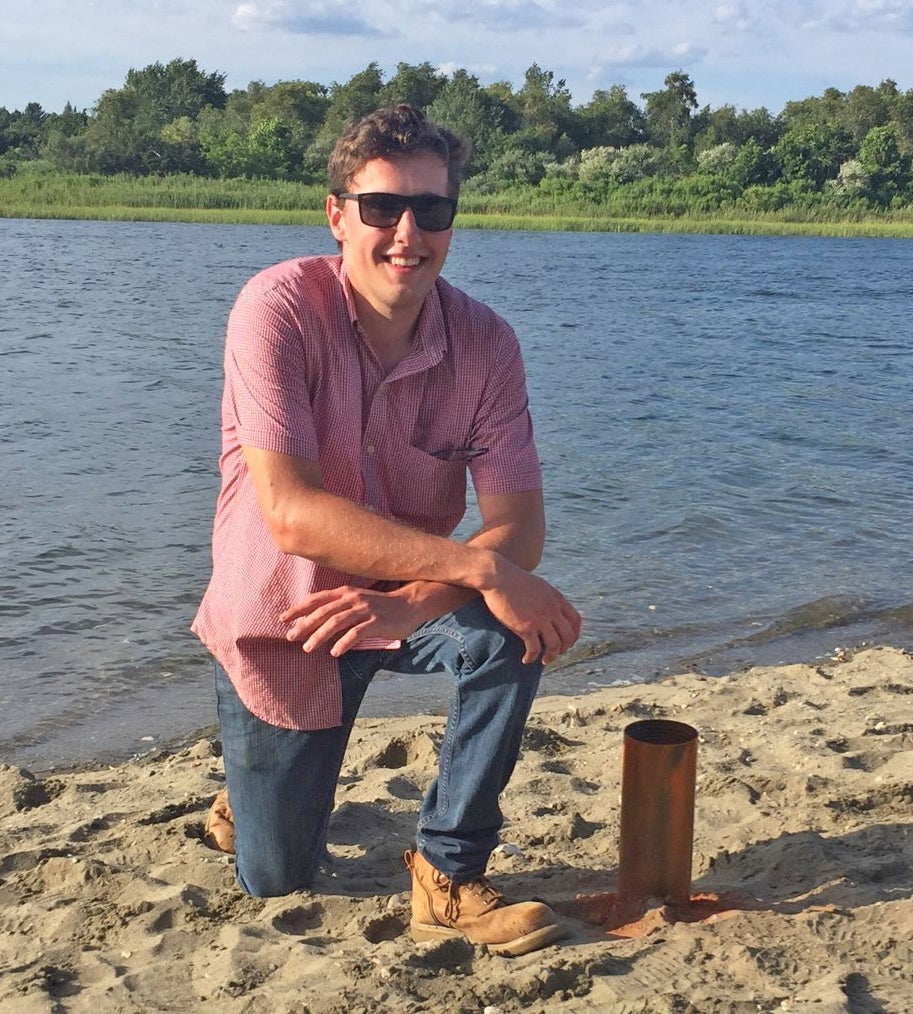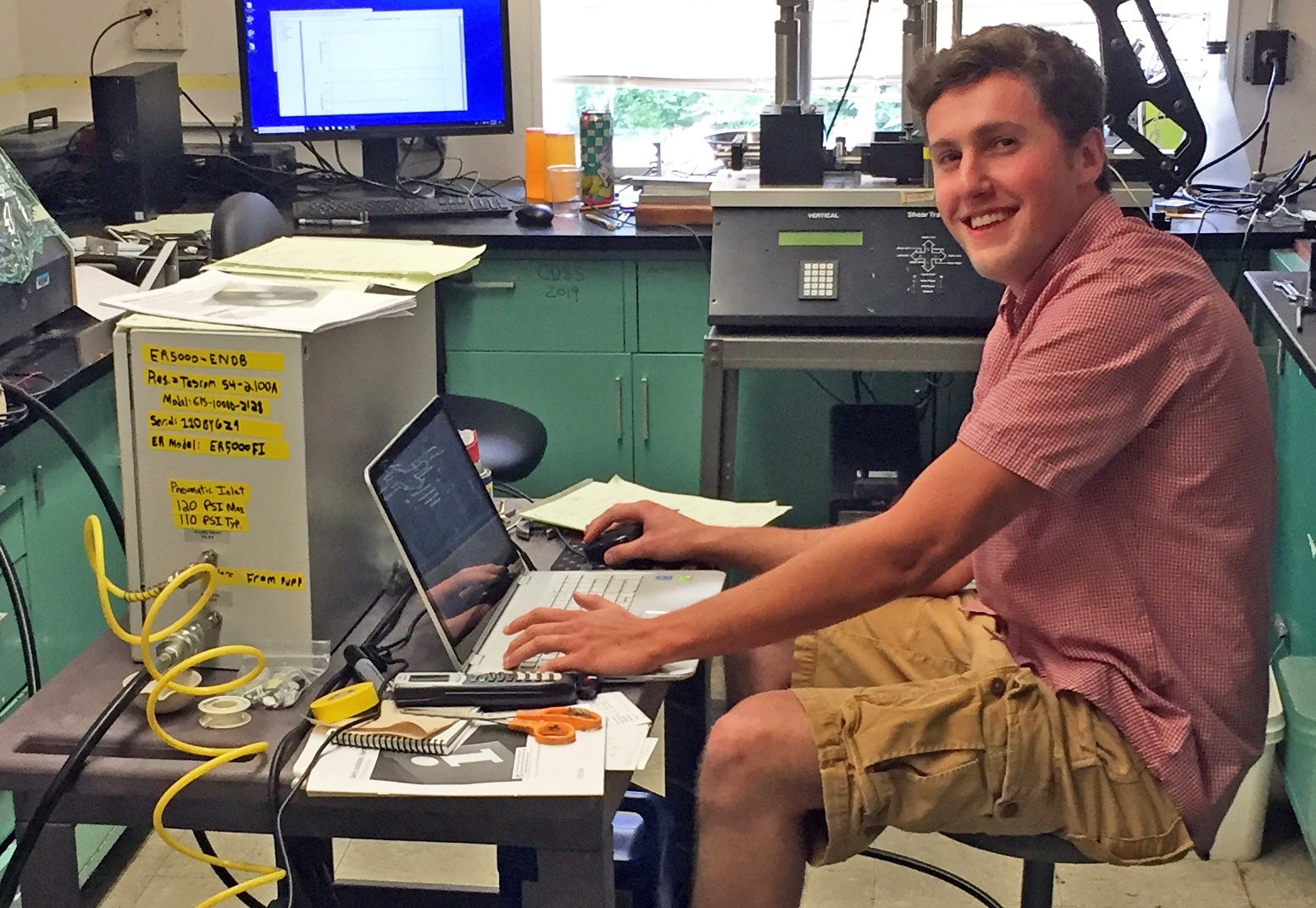KINGSTON, R.I. – Aug. 15, 2019 — Timothy Keefe’s interest in geotechnical engineering traces back to his childhood when his father taught him how to dig for quahogs in Narragansett Bay.
“When digging for quahogs, you have to agitate the soil surrounding the quahogs,” said Keefe, who is pursuing his master’s degree in civil engineering at the University of Rhode Island. “Without realizing it, I was literally getting my feet wet in learning about soil mechanics.”
Years later as an engineering student at URI, Keefe is still learning about the properties of soils and other materials.
“I’m very interested in the challenges involved in developing raw land and earth into usable infrastructure, which has drawn me further into this aspect of engineering,” Keefe said.

Currently, Keefe is working as a research assistant with Associate Professor Aaron Bradshaw and Professor Christopher Baxter on a project studying the behavior of piles for offshore wind jacket structures.
“Along with Professors Bradshaw and Baxter, I oversaw the driving of a 15-foot-long, 4.5-inch diameter steel casing,” said Keefe. “It is part of a series of casing sections to be installed and tested for cyclic capacity at a site at Allen Harbor in Quonset, Rhode Island.”
The pile itself was not made at URI, but it is being tested using cyclic testing equipment in URI’s Marine Geomechanics Laboratory at the Narragansett Bay Campus.
“Tim has been developing the load-testing equipment needed to apply thousands of cycles of loading the test piles,” said Bradshaw. “He’s heavily involved with the installation and testing of the piles through August and into the fall semester.”
According to Bradshaw, the practical outcome of the research is to validate and/or improve the methods used to design the piles for these types of structures, which may be used on future offshore wind projects in the United States.
The prime sponsor of the project is the Bureau of Ocean Energy Management. URI and the University of Texas at Austin are subcontractors on the project to the Norwegian Geotechnical Institute. A significant portion of the project involves load testing of pipe piles installed at two test sites in Rhode Island and Texas.
The skills Keefe is gaining will prove advantageous when he starts his career.
“A lot of what I am learning on the current project will be beneficial in my career,” Keefe said. “Besides all of the soil behavior concepts that will be extremely helpful in designing structures, such as strength properties, soil classification, foundation design and testing, I am also spending a good amount of time coordinating the project and preparing reports, which is enhancing my project management skills.”
Keefe recently received a $2,500 scholarship from the Deep Foundations Institute (DFI), an international membership association of contractors, engineers, manufacturers, suppliers, academics and owners in the field of design and construction of deep foundations and excavations.
“I was quite shocked and delighted when I found out I had received the scholarship,” said Keefe, who is from Cumberland, Rhode Island. “The Deep Foundations Institute is an influential organization in the geotechnical engineering world and to be recognized by them makes me feel very honored.”
Keefe was one of 23 students in the United States to receive a scholarship from DFI.
“Tim is deserving of the DFI award for the same reasons that make him a good researcher,” said Bradshaw, who is Keefe’s faculty adviser. “He is dedicated, hard-working, self-motivated, a problem solver, and he is a pleasure to work with.”
During the last two years of his undergraduate studies, from fall 2017 to spring 2019, Keefe worked as an intern at DiPrete Engineering in Cranston.
“The experience at DiPrete strengthened my knowledge of engineering and taught me skills such as drafting and site development, which will be very helpful going forward in my career,” said Keefe.
Coincidentally, DiPrete sponsored the senior capstone project Keefe worked on with his classmates.
“I served as the project manager of my team,” recalled Keefe. “We had to develop a mock redevelopment plan of a site in East Providence, covering all aspects of civil engineering. I managed my teammates as they performed the detailed designs of the specific aspects of the site.”
Staying true to his roots, Keefe still enjoys digging for quahogs.
“My family and I still dig for them recreationally on the weekends,” said Keefe. “But a true shell fisherman never gives away his spot.”

